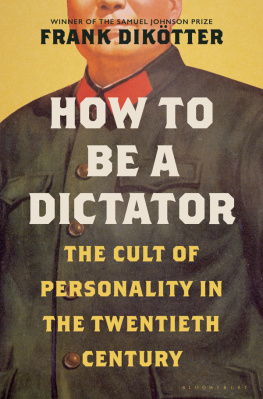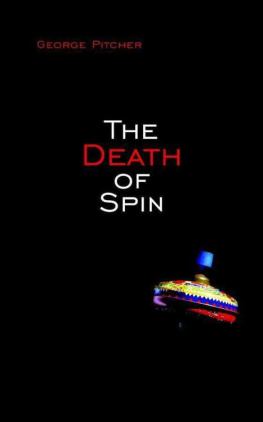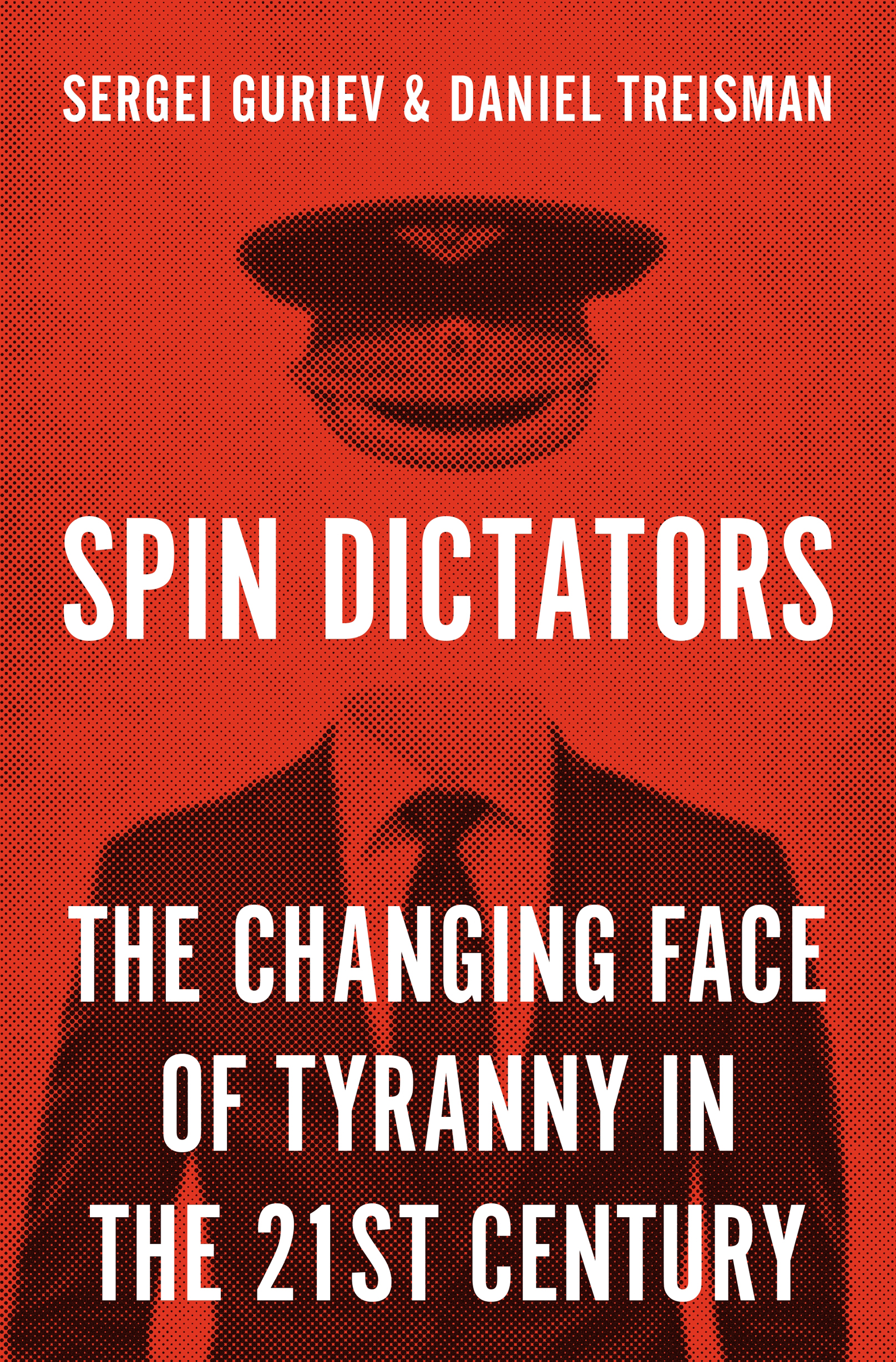SPIN DICTATORS
SPIN DICTATORS
THE CHANGING FACE OF TYRANNY IN THE 21ST CENTURY
SERGEI GURIEV AND DANIEL TREISMAN
PRINCETON UNIVERSITY PRESS
PRINCETON AND OXFORD
Copyright 2022 by Princeton University Press
Princeton University Press is committed to the protection of copyright and the intellectual property our authors entrust to us. Copyright promotes the progress and integrity of knowledge. Thank you for supporting free speech and the global exchange of ideas by purchasing an authorized edition of this book. If you wish to reproduce or distribute any part of it in any form, please obtain permission.
Requests for permission to reproduce material from this work should be sent to .
Published by Princeton University Press
41 William Street, Princeton, New Jersey 08540
99 Banbury Road, Oxford OX2 6JX
press.princeton.edu
All Rights Reserved
ISBN 978-0-691-21141-1
ISBN (e-book) 978-0-691-22446-6
Version 1.0
British Library Cataloging-in-Publication Data is available
Editorial: Bridget Flannery-McCoy and Alena Chekanov
Production Editorial: Jenny Wolkowicki
Jacket design: Karl Spurzem
Production: Erin Suydam
Publicity: Kate Hensley and Kathryn Stevens
Jacket images: Shutterstock
To Katia, Sasha, and Andrei
SG
To Susi, Alex, and Lara
DT
CONTENTS
- ix
PREFACE
Early in the twenty-first century, global politics hit a major milestone. For the first time, the number of democracies in the world surged past the tally of authoritarian states. As this seismic third wave crested, experts identified 98 countries with free government, compared to 80 still controlled by dictators. The optimism was infectious. New information technologies, globalization, and economic development seemed to be calling times up on strongman rule. As countries modernized, tyranny was becoming obsolete.
The celebrations did not last long. In fact, they hardly got started. Within a few years, the advance of freedom had petered out, yielding what some quickly termed a democratic recession. A dramatic financial crisis, born in the United States, sent the global economy crashing, undercutting faith in Western governance. By 2019, the number of democracies had fallen to 87 while that of dictatorships was back up to 92. In the West, liberalism was proving little match for populism, while in the East, all eyes were turned to Chinas meteoric rise. The millennial exuberance gave way to a sense of gloom.
Todays political pessimism is a bit overdone. By most measures, global democracy remains not far below its all-time high. But the dark mood points to a genuine puzzle. Even if dictatorships are not taking over, the question is how they can survive at alland even prosperin an ultramodern world. Why, after all the brutal manias of the twentieth centuryfrom fascism to communismhave been discredited, do we still see new autocracies rising from the ashes? And what to make of the strongmen who are embracing tools of modernity, using Western technologies to challenge Western ways of life?
With its unmatched population and explosive growth, China has been pegged as the counterargument to liberal democracy. Its economic successhardly dented by the 20089 slump or even the 2020 Covid crisisseems to contradict the equation of development with popular rule. And yet, outside the metropolises of Beijing and Shanghai and the glittering entrepts of Hong Kong and Macau, most of the country remains quite poor, its population still manageable by industrial-era and even preindustrial methods. The bigger puzzle is the survival of unfree government in affluent societies such as Singapore and Russia, where university degrees are more common than in most Western democracies. Do such cases offer a glimpse into an authoritarian future?
This book is an attempt to explain the nature of current dictatorships. It grew out of a mixture of research and personal experience. We both spent years tracking the rise of Putins system in Russia, through academic analysis and firsthand observation. His regime came to seem to us not unique but rather an exemplar of trends that were reshaping authoritarian states worldwidefrom Hugo Chvezs Venezuela and Viktor Orbns Hungary to Mahathir Mohamads Malaysia and Nursultan Nazarbayevs Kazakhstan. Observers struggle with what to call these leaders. Some fall for their pantomime of democracy; others offer awkward analogies to historical strongmen, labeling Putin a tsar or Erdoan a sultan. We see all these rulers as converging on a novelthough not unprecedentedapproach that can preserve autocracy for a while in even modern, globalized settings. The key to this is deception: most dictators today conceal their true nature. So the first step is to understand how they operate. In the chapters that follow, we explore why these regimes emerged, how they work, what threats they pose, and how the West can best resist them.
The book is based on theoretical and empirical research that we have published in economics and political science journals. Our hope here is to make the key ideas more accessible. Wherever possible, we back up our claims with references to published studies (including our own) and data. A variety of tables and graphs appear in an online supplement, accessible via https: / /press.princeton.edu/books/spin-dictators. We refer to this material in the respective chapters closing sections titled Checking the Evidence.
Over the years, many colleagues and friends have shared thoughts on the ideas we present here. We are grateful to Alberto Alesina, Maxim Ananyev, Marina Azzimonti, Timothy Besley, Bruce Bueno de Mesquita, Brett Carter, Chao-yo Cheng, George Derpanopoulos, Tiberiu Dragu, Georgy Egorov, Cherian George, Lisa George, Francesco Giavazzi, Gilat Levy, Andrew Little, Elias Papaioannou, Torsten Persson, Richard Portes, Andrea Prat, Eugenio Proto, Gerard Roland, Arturas Rozenas, Miklos Sarvary, Paul Seabright, Daniel Seidmann, David Skarbek, Konstantin Sonin, Francesco Squintani, Eoghan Stafford, David Stromberg, Guido Tabellini, Gergely Ujhelyi, Qian Wang, Feng Yang, and Fabrizio Zilibotti. Cevat Aksoy, Anders Aslund, Jonathan Aves, Danny Bahar, Carles Boix, Maxim Boycko, Javier Corrales, Tim Frye, Barbara Geddes, Scott Gehlbach, Susan Landesmann, Lee Morgenbesser, Peter Pomerantsev, Molly Roberts, Dani Rodrik, Michael Ross, Andrei Shleifer, Andrei Soldatov, Art Stein, Milan Svolik, Adam Szeidl, Ferenc Szucs, Michel Treisman, Josh Tucker, David Yang, and Ekaterina Zhuravskaya read all or parts of the manuscript and offered invaluable comments, as did two anonymous readers. We thank Andrei Shleifer in particular for encouraging us to develop our arguments into a book. Of course, we are solely responsible for any remaining mistakes. Kevin Gatter, Nikita Melnikov, and Ekaterina Nemova provided excellent research assistance. At Princeton University Press, we benefited from the expert guidance and encouragement of Bridget Flannery-McCoy, Sarah Caro (now at Basic Books), Eric Crahan, and Alena Chekanov.
INTRODUCTION
CHAPTER 1
FEAR AND SPIN
Dictators have been changing. The classic tyrants of the twentieth centuryAdolf Hitler, Josef Stalin, Mao Zedongwere larger-than-life figures responsible for the deaths of millions. They set out to build new civilizations within their tightly guardedand sometimes expandingborders. That meant controlling not just peoples public behavior but also their private lives. To do that, each created a disciplined party and a brutal secret police. Not every old-school dictator was a genocidal killer or the prophet of some utopian creed. But even the less bloodthirsty ones were expert at projecting fear. Terror was their all-purpose tool.












